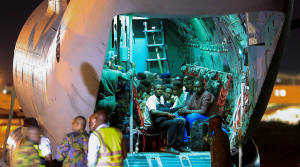WHO warns of Sudan biohazard as lull in fighting allows more to flee
 Send a link to a friend
Send a link to a friend
 [April 25, 2023]
By Khalid Abdelaziz [April 25, 2023]
By Khalid Abdelaziz
KHARTOUM (Reuters) -Fighting in Sudan eased overnight after the army and
a rival paramilitary force agreed to a three-day truce, allowing more
Sudanese to flee on Tuesday and foreign countries to extract citizens.
However, the World Health Organization said there was a "high risk of
biological hazard" in the capital Khartoum after one of the warring
parties seized a national laboratory holding measles and cholera
pathogens and ejected the technicians.
The warfare that erupted between the army and the Rapid Support Forces (RSF)
paramilitaries on April 15 has turned residential areas into war zones,
killing at least 459 people, wounding over 4,000, and cutting water,
power and food in a nation already reliant on aid.
Foreign countries have airlifted embassy staff out of Khartoum, the
capital, after several attacks on diplomats, including the killing of an
Egyptian attache shot on his way to work. Some countries are also
extracting their private citizens.
On Tuesday, Britain launched a large-scale evacuation of its nationals
on military flights from an airfield north of Khartoum. France and
Germany said they had each evacuated more than 500 people of various
nationalities, and that a French commando had been hit by crossfire
during the operation.

Sudanese families too used the lull to emerge from their homes after
more than a week of fierce fighting to search for transport to take them
to safety, worrying that the exodus of foreigners would leave locals
more at risk.
"Maybe the hardest moment is thinking about leaving the country," said
Intisar Mohammed El Haj, a resident of Khartoum who said her children
had hidden under beds from the sound of explosions before the family
fled to Egypt.
Tens of thousands have left in the past few days for neighbouring Chad,
Egypt, Ethiopia and South Sudan, despite the uncertainty of conditions
there.

The situation for those remaining in Africa's third-largest country,
where a third of the 46 million people needed aid even before the
violence, is deteriorating fast. Some expressed dismay at the departure
of some international aid agencies and diplomats.
The United Nations humanitarian office said on Tuesday it had cut back
activities due to the fighting.
'BODIES IN THE STREETS'
One Khartoum resident, who declined to give his name, said he feared
that with fewer international observers, fighting forces would show less
respect for civilians.
Speaking to reporters in Geneva via video link from Sudan, the WHO's
Nima Saeed Abid said technicians had been thrown out of the National
Public Health Laboratory, which also contains blood supplies, because it
had been seized by one of the warring parties, which he declined to
name.
[to top of second column]
|

Evacuees from war-torn Sudan sit inside
a military plane as they wait to be processed by members of the
Kenya Defence Forces (KDF) upon their arrival at the Jomo Kenyatta
International Airport in Nairobi, Kenya, April 24, 2023.
REUTERS/Thomas Mukoya

"This is the main concern: no accessibility to the lab technicians
to go to the lab and safely contain the biological material and
substances available," he said.
Yassir Arman, a leading figure in the civilian political coalition
the Forces for Freedom and Change (FFC), urged humanitarian
organizations and the international community to help restore water
and electricity, and send generators to hospitals.
"There are bodies scattered in streets and sick people who cannot
find medicine, no water nor electricity. People should be allowed to
bury their dead during the ceasefire," he said.
Food, clean water, medicines and fuel are in short supply, U.N.
agencies said, and communications and electricity are limited, with
prices skyrocketing. Residents reported that a bus ticket to Egypt
had jumped six-fold, to $340.
The RSF accused the army of violating the 72-hour truce agreed on
Monday and of attacking its troops' position at the presidential
palace in Khartoum.
The foreign ministry accused the RSF of attacking diplomats, citing
the killing of the Egyptian diplomat.
The Sudan Armed Forces (SAF) said the U.S. and Saudi Arabia had
brokered the ceasefire. U.S. Secretary of State Antony Blinken
announced the agreement first and said it followed two days of
intense negotiations. Several previous truces failed to last long.
A Reuters witness heard sporadic gunfire on Tuesday morning in the
city of Omdurman, adjacent to the capital.
Ahead of the evening truce announcement, air strikes and ground
fighting had shaken Omdurman, and there were also clashes in
Khartoum.
Dark smoke shrouded the sky near the international airport in
central Khartoum, near the army headquarters, and booms of artillery
fire rattled the surroundings.
U.N. Secretary-General Antonio Guterres said that the violence in a
country that flanks the Red Sea, Horn of Africa and Sahel regions
"risks a catastrophic conflagration ... that could engulf the whole
region and beyond".
(Reporting by Khalid Abdelaziz in Khartoum; Additional reporting by
Kylie MacLellan in London and Kiyoshi Takenaka, Kantaro Komiya,
Nobuhiro Kubo, Mariko Katsumura and Elaine Lies in Tokyo and Emma
Farge in Bern; Writing by Michael Georgy and Frank Jack Daniel;
Editing by William Maclean)
[© 2023 Thomson Reuters. All rights
reserved.]This material may not be published,
broadcast, rewritten or redistributed.
Thompson Reuters is solely responsible for this content.
 |